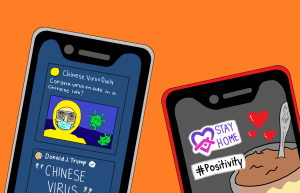How COVID-19 Social Media Posts Cause Mass Hysteria
April 23, 2020
Since the beginning of the Coronavirus outbreak, there has been a 40% increase in phone usage in America according to Statista. This increase of screen time can lead people to frequently stumble upon frightening social media posts. On all platforms, people are spreading exaggerated or even false information on the Internet without realizing its consequences.
Untruthful or exaggerated information can not only cause an unnerving amount of anxiety, but also cause people with obsessive compulsive disorder (OCD) or germophobia to become extremely particular with every step they make.
“The Coronavirus made me increase my daily habits, such as washing my hands for longer periods of time, and I get more paranoid easily,” junior Soumili Vasamsetty said. “I tend to disinfect things more often than I usually did.”
Along with the increase of symptoms of mental illness, “There were conspiratorial whispers on social media that the Coronavirus had been cooked up in a secret government lab in China,” according to the New York Times.
President Trump and other politicians and congressmen tend to replace the scientific term for Coronavirus with the title “Chinese Virus.” Stigmas like these are one of the greatest causes for the recent numerous occurrences of hate crimes against Asians.
“As a teen who uses lots of social media apps, there’s a lot of negativity going around due to the current pandemic. Just being seen as an Asian to the public, I’ve been accused of having coronavirus or being the reason it has spread,” junior Nicole Nguyen said. “Although I don’t let those comments get to me, it bothers me that there are people in our society today who now have a totally different view of Asians as a whole.”

With the overwhelming amount of bigoted Coronavirus posts and commentary shoved in students’ faces daily, it is hard not to become cynical or have our judgements swayed the wrong way.
To combat the anxiety, “take breaks from watching, reading or listening to news stories, including social media [since] hearing about the pandemic repeatedly can be upsetting,” according to the Centers for Disease Control (CDC).
If all students took part in frequent phone breaks, social media cleanses, relying on trustworthy news sources and reporting hysterical or racist posts, it would be one large step towards the overall prevention of nationwide racism and unrest.




